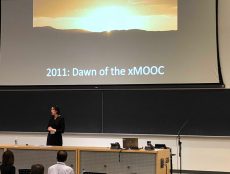
Articles
Editor’s Picks
With Many Learners On the Wrong Side of the Digital Divide, This Appalachian District Has Handled Hybrid Learning with Resilience
By Rebecca Hinkle
December 17, 2020
In the mountains of southern West Virginia, McDowell County forms an isolated and tight-knit community. Once a thriving county supported by nearby coal mines, McDowell has changed a lot over the past decades. Downtown Welch, the seat of the county, reveals streets lined with now empty shops and a suffering local economy. One source of local pride remains McDowell County Schools and how the district has handled the shift to hybrid learning.
An order for laptops is still delayed. Some students hand in assignments by taking a picture and texting it to their teachers. Learners with a history of drug abuse or absenteeism are struggling. But despite these hurdles, hybrid learning is still in session five days a week.
McDowell County in general has faced several challenges in recent years. The region has been hit with the opioid crisis, poverty, lack of housing, an outdated internet infrastructure, and transportation issues that impacted their residents and students harshly. With the outbreak of Covid-19, McDowell County had to make a sudden shift to hybrid learning. Like many other rural communities in the U.S., existing challenges made this abrupt change all the more difficult.
How Have the Students Done with Hybrid Learning?
At the start of the pandemic, McDowell County schools gave families the option of coming to in-person school or virtual learning. 47% chose virtual learning while the rest chose to be on school grounds for in-person learning. For those who chose the option of virtual learning, parents and guardians had to ensure the school board that the student had an internet connection. The schools in turn made sure that the students had a device to use.
At the start of the pandemic, over 3 million children were estimated to not have high-speed internet in their homes. Many of these learners attend one of McDowell County’s seven elementary schools, two middle schools, and two high schools. For them, online learning was not a choice.

“At the high school level, every teacher has one period when they teach virtual students,” said McDowell County Schools Superintendent Carolyn Falin. “Then they do core subjects 3 days a week and teach another subjects the other 2 days of the week. So the students are not bombarded with being online all day long in front of virtual teachers.”
Students are expected to complete other assignments when they are not online. Hotspots are available at school parking lots if students have internet issues at home, if students are able to get there. Since the start of the pandemic, more internet access has been made available in the area, but some students live in regions where high speed connections are not possible.
Continuing Class with Hotspots, Paper, and Ink
Frazier McGuire, the principal of River View High School, discussed how teachers have been flexible with those students with limited internet access.
“We know sometimes students cannot login when they are supposed to. We know sometimes they cannot submit things when deadlines are due, and the teachers have been really good about extending deadlines and working with them,” said McGuire. Some students have been able to scan completed assignments and email them to their teachers, and some have even taken pictures of their assignments and handed them in via text.
For those students who are unable to get to the hotspots or have limited internet, the school sends them packets to complete at home.
“We do have some areas in our county where the students do not have access to internet in their home, so going full remote is difficult,” Falin said. “For one, we don’t have technology for all the kids yet, and two, not all of our kids have access to an internet connection.”
https://twitter.com/SchoolsMcdowell/status/1339561020638048257
K-2 students have been using Chromepads while grades 3-12 are using Chromebooks. However, some schools in McDowell have not received their orders for Chromebooks.
“Originally, we were told that we would have them over the summer, then it was moved to September, then it was October, and now I’m not sure when they will be here,” said McGuire. The schools did have backups for students to take, but that has also posed a challenge. The devices are older products and schools have had to switch them out several times for replacements.
What Support Is there for Families and Students?
With more students online than ever before, it is a pretty common occurrence now to have parents or guardians who are not as computer literate as their children. In response to this and to create better communications with the families of students, McDowell created a tech support group for parents and guardians to reach out to answer questions.
“We have virtual family tech support two days a week,” Superintendent Falin said. “A few teachers at each school are available to answer questions that parents might have on anything.”
There is also the question of providing support for students who have a history of drug abuse within families, poverty, and a history of absences. It was already difficult for schools to provide the emotional and social support those students need. In 2001, McDowell County schools were taken over by the state to address and provide aid to students who faced poverty crisis, repeated absences, and drug abuse in the home. Control was reinstated in 2013. Now, with remote learning, educators are seeing that students who did not have a history of issues with absences tend to choose to learn in person. But those who have a history of repeated absences are more likely to choose remote learning.
“The one thing that has made it more difficult is not having all the students in school,” said Principal McGuire. “It’s hard to provide them the support that they need and have gotten in the past.”
McGuire also discussed how, for their counselors to provide more support to students, they will call and check on them on a daily basis. Teachers will also keep track of attendance during class by seeing them on camera.
Although, this year has been a struggle, educators and board members are recognizing the positive impact that remote learning has created.
“Ideally, distance learning is not for everybody,” Principal McGuire said. “We have some kids who are doing really well in it, some are not. I do think that for those students who are getting ready to go to college, it is some valuable experience for them because a lot of the classes they take will be online. It has also forced students and staff to utilize technology they would not have used. It has forced people to step out of their comfort zones.”









[…] have declared MOOCs (massive open online courses) to be dead over and over and over again. True, they have transformed significantly since they gained a huge amount of hype in 2012 with the launch of Coursera, edX, and Udacity. But […]
[…] have declared MOOCs (massive open online courses) to be dead over and over and over again. True, they have transformed significantly since they gained a huge amount of hype in 2012 with the launch of Coursera, edX, and Udacity. But […]